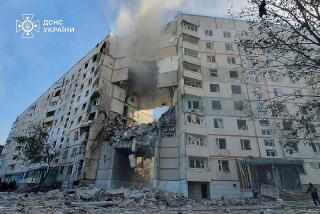Armenians Capture Key Karabakh Town : Republics: Both sides agree the fall of the last Azerbaijani stronghold marks a turning point in the four-year struggle over the disputed enclave.
- Share via
MOSCOW — Armenian militants captured the last major Azerbaijani stronghold in the strife-torn enclave of Nagorno-Karabakh on Saturday in a pitched battle, fought street to street and with heavy artillery exchanges, that left dozens of people reported dead.
The fall of the town of Shusha marked a turning point in the four-year conflict over Nagorno-Karabakh, both sides agreed. But while Armenians said it could open the way to peace, Azerbaijanis predicted only further, intensified war and swore to retake their lost territory.
Azerbaijani agencies reported the fighting over Shusha continued into Saturday night and that Armenian militants were battling to break a corridor through Azerbaijani territory to connect Nagorno-Karabakh with Armenia proper.
“The fighting is far from over,” said Lt. Vagif Dargyakhly, a spokesman for the Azerbaijani Defense Ministry. Flare-ups along the Armenia-Azerbaijan border fueled fears that the Nagorno-Karabakh fighting could escalate into full-fledged war between the two former Soviet republics.
More than 1,500 people have been killed since early 1988 in the conflict over Nagorno-Karabakh, an enclave administered by Azerbaijan but populated mainly by Armenians.
The taking of Shusha appeared to create one more obstacle to attempts by Armenian and Azerbaijani leaders to resolve the conflict peacefully through internationally backed talks.
Acting Azerbaijani President Yagub Mamedov complained to the leaders of Iran and Turkey that Armenian fighters stormed Shusha just as he and his Armenian counterpart were signing a new cease-fire agreement in Tehran.
“This act of bad faith,” Mamedov said, according to his press service, made Armenia’s participation in the Tehran talks “look like nothing but a political game.”
But a spokesman for Armenian President Levon Ter-Petrosyan contended that the cease-fire talks and the storming of Shusha should not be linked.
Ter-Petrosyan’s press secretary, Ashot Antinian, said that Azerbaijani fighters had recently increased their attacks from Shusha on the Armenian-populated capital of Stepanakert and that Nagorno-Karabakh’s leaders had finally decided Thursday to launch a drive to clean out the points where the attacks originated.
With Shusha taken, he said, “now there’s new hope that the efforts of international intermediaries will stabilize the situation,” and the Tehran cease-fire agreement could still take effect.
Ter-Petrosyan told Russian Television that despite Armenia’s desire for peace, it simply lacks the power to dictate military moves in Nagorno-Karabakh.
Ter-Petrosyan explained the Nagorno-Karabakh situation in a phone conversation with President Bush, according to the Itar-Tass news agency, and Armenian Foreign Minister Raffi Hovannisian spoke with Secretary of State James A. Baker III and his counterparts in Iran, Germany and Britain.
Hovannisian argued that for peace talks to work, Nagorno-Karabakh representatives must participate directly. The talks in Tehran included only the Armenian and Azerbaijani leadership, even though Nagorno-Karabakh is seeking recognition as an independent entity.
Although Shusha, with a peacetime population of 40,000, was the last large town in Nagorno-Karabakh still inhabited by Azerbaijanis, many Azerbaijani villages remain.
Dargyakhly of the Azerbaijani Defense Ministry said exact casualty figures in the Shusha battle were unavailable, but the Azerbaijani Popular Front said the death toll among Azerbaijanis could be as high as several hundred. At least 30 Armenians died in two days of battles, according to Itar-Tass.
The fight for Shusha was waged with tanks, artillery, dozens of armored vehicles and military helicopters, part of the swelling arsenal that both sides obtain largely by raiding or buying former Soviet army stores. Armenians reported last week that the Azerbaijanis had begun using a powerful new weapon: a dive bomber hijacked last month from a Soviet base near their capital, Baku.
The fall of Shusha heightened speculation in Azerbaijan that a military coup could be in the works to preempt presidential elections scheduled for June 7. Opposition members accused the Azerbaijani leadership of purposely surrendering Shusha to provide an excuse for introducing a state of emergency.
More to Read
Sign up for Essential California
The most important California stories and recommendations in your inbox every morning.
You may occasionally receive promotional content from the Los Angeles Times.













